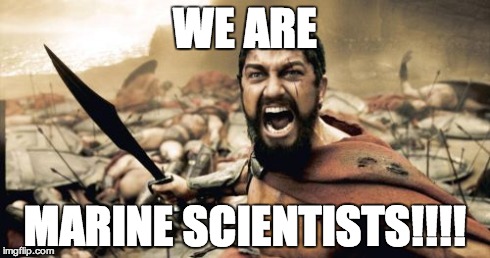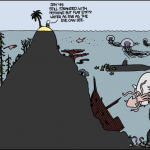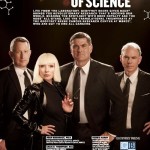
Recently I attended a talk by my good friend and fantastic researcher, Brian Sidlauskas. His talk was a retrospective over his research and what contributed to his academic success. A key part of his advice
- Don’t skip happy hours. Weekly lunches, tea times, happy hours, and other structured but informal meeting times with other scientists are vital. More often than not I hear academics state they do not have the time for these events. But I cannot stress enough how important these are. First, you need a break. These times provide this while still being productive. They allow you discuss recent science, stumbling blocks in your own research, new research ideas, and a whole host of other ideas. In addition, they allow you to forge relationships with your colleagues, those colleagues you will be depending on and interacting with most of your career. You never know what benefit these times might provide. Brian met his current graduate student as one of these functions. I had a paper that resulted out of one of these happy hours. Rachel Jeffreys also noted that you need to “make time for lunch…to talk with your colleagues so many scientists either (a) eat at their desk or (b) on the go and on the continent they really do stop for lunch… like for 1 whole hour and talk to each other. I know we are all busy but food and good conversation fuel the brain!”
This got me thinking about what pieces of advice would I tell other scientists.
- Don’t work weekends and evenings…unless you want to. I rarely work weekends or evenings. My mind needs time to recharge and time away from science. For me I can accomplish more in a 40-hour workweek than I can in 60 hours. There is substantial research to back me up on this too.
This 2011 synthesis paper (full text, PDF) by the International Labour Organization reviewed available research into the relationship between productivity and hours worked. The core conclusion: Longer hours do not make you more productive, and can in fact have the opposite effect: You’ll get less done, and what you do get done is never your best work (or has to be revisited or corrected later). The ILO paper isn’t the only one on the topic. A similar paper by the European Foundation for the Improvement of Living and Working Conditions (full text, PDF) pointed out that among the 16 of the EU nations, people who worked more flexible hours or jobs that would be normally considered part-time were overall more engaged with and productive at work and happier in their off-time than people who worked more hours.
- Be passionate. Others will tell you that science should be an emotionless endeavor. Well good luck with that. If you don’t get super excited about what ever you are studying then you are probably not going to make it. Rejection of papers, grants, and jobs will face you at every turn and bring you down. You better damn well be excited about the questions you are working on. And don’t apologize for it. I love tiny deep-sea snails. How did they get so tiny? When I can’t find a job, I’ll still have my tiny snails. You don’t see Brian Sidlauskas apologizing for studying fish heads of drab little beasties inhabiting freshwater. He’s so excited about them it makes me excited about them. That is the kind of science and scientists I want to be around.
- Don’t forget why you wanted to do this. When you get those rejections and your scientific career is generally weighing you down, remember why you do this. It is not for the Nature or Science publication. It is because sorting little snails and worms out of decaying stinking wood is the best thing that has ever happened to you. Trying to figure out the riddles of biodiversity is about the coolest question you can ask. But these are mine. Find yours. Write them down and post them above your computer so you don’t forget. Or if you are like me start a blog called Deep-Sea News so that writing about these topics is a constant reminder.
- Manage your time. My week is schedule down to the 15-minute interval. No time is wasted…well almost no time. I spend even 15-minute blocks writing or doing analyses. Don’t fall into the trap of thinking you cannot accomplish things in small chunks of time. Also pick a day of the week to take all of your meetings. Putting them all on the same day reduces breaking up your time on other days. Also reserve one day of week where you take no meetings or anything else. You just do research and write uninterruptedly. Find a safe area if you need to. I learned this last one from my Ph.D. advisor Mike Rex. Hat tip to him for this valuable lesson. Holly Bik also commented on managing your time. “Find a calendar/scheduler system (iCal, Google Calendar) to manage all your deadlines, due dates, and meetings. Use it ruthlessly. It will reduce your stress and help you use your time most efficiently.”
- Allow yourself time to play at science. As Thomas Schlacher stated “Do research out of pure unadulterated curiosity without hypotheses. When I started my first academic appointment I asked the department head what I should do with the start up grant I was given. The answer was: ‘go out and find something interesting!’”
Here are some of favorites from my scientist friends on Facebook
- Jarrett Byrnes: Be gracious about admitting when you’re wrong. Remember, we’re all about science and truth, not pet theories.
- Katie Paul Friedman: Kindness is returned– a favor for another scientist is usually returned if not directly than indirectly. You never know which postdocs end up being department heads! Rick MacPherson: Pay it Forward… The kindness you get is proportional to the kindness you give. We all need boosts whether early, mid, or late career. Dole out support to your peers, but make sure it comes with an expectation for them to pay it forward.
- Andrew David Thaler: Dress like you actually care about what you’re doing.
- Kim Martini: Catalog your triumphs! Craig McClain: And take time to celebrate them no matter how small. As Alex Warneke put it “Don’t underestimate the power of having a dance party in your office.”
- Amanda Kahn: ‘Eureka’ moments are rare but memorable. Recall those when needed.
- Amanda Kahn: everyone needs an outlet, whether physical exercise, music, or social circles (hopefully all of those things). Don’t neglect those because you won’t get more work done.
- Holly Bik: Go on a REAL vacation at least once a year. Conferences are not vacation, no matter how tropical the locale. Get away and disconnect – your email is not urgent, it can wait 1-2 weeks (and being tech free will save your sanity).
- Holly Bik: Your field/discipline is a small world–don’t burn bridges, build up personal relationships.
- Jonathan Payne: Do not fall for the sunk cost fallacy. If a project isn’t working, move on to something else quickly!
- Andrew Lewin: Collaborate with other scientists and have fun doing it
- Andrew Lewin: Don’t just teach…mentor. Craig McClain: YES, YES, YES!
And now a few from Twitter.







Nice article… its true that you need to mingle with other scientists be it the ones near you or not…youll never know the kind of help they could offer.
I love this. I’m sending it to my students!
Janet, I’m glad people are finding it useful.
dr. m = boss.
Dr. M, et al., great advice and I especially like: “Do research out of pure unadulterated curiosity without hypotheses. When I started my first academic appointment I asked the department head what I should do with the start up grant I was given. The answer was: ‘go out and find something interesting!’”, and “Be passionate”.